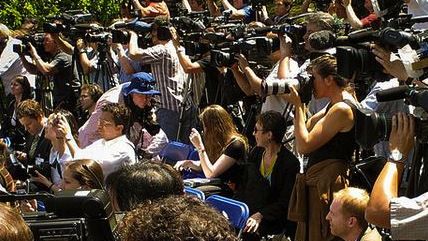Do Unto Others, But Not Unto Us, Say the Media
NYT wants more regulation for everyone else

Miracle of miracles: The New York Times finally has found an industry regulation it doesn't like. The other day the gray lady denounced "Britain's Press Crackdown," which it described as an "attempt to rein in [Britain's] reckless tabloid newspapers"—but one that would "chill free speech and threaten the survival of small publishers and Internet sites." Such regulations, the paper said, "would do more harm than good" because "an unfettered press is essential to democracy."
To put things mildly, this is not the standard posture for The Times—which currently is pounding away in an editorial series demanding more regulation of guns and gun owners. And when America's No. 1 paper is not treating the Second Amendment like No. 2, it is demanding tougher regulation of the banking industry. And the food industry. And power plants. And home-care aides. And on and on. "Government regulations," the paper declared in an editorial last year on "The Phony Regulation Debate," "keep the air and water clean, improve the safety of consumer products, reduce workplace hazards, and prevent destructive financial practices."
In short, regulation is great—except when it comes to the press.
In this, The Times enjoys a great deal of company. Major news outlets are forever churning out investigative reports exposing the horribly inadequate government oversight of this industry and that one. "Federal regulators and the mining industry are failing to protect miners," declares NPR. "Federal regulators have been working closely with the nuclear power industry . . . by repeatedly weakening [safety] standards, or simply failing to enforce them," warns the Associated Press. There are drugs in the water supply, and payday lenders ripping off the poor. Why isn't the government doing more?
After Hurricane Sandy struck last fall, "Today" reporter Jeff Rossen did an exposé on how some contractors were "preying on" homeowners. How? By performing repair work without the proper licenses. Rossen found several contractors who lacked home-improvement licenses, but only one consumer who had been taken advantage of—and that was two months before Sandy struck. His big story boiled down to the fact that some Sandy-related tree removal and home repair work was carried out without prior government permission.
But wait—does Rossen have a license to practice journalism? Does he think journalists should be licensed? I reached out to Rossen by email. "What can I do for you?" he wrote back. But when I put those questions to him, he never responded—much like the unlicensed contractors he caught on camera. How scandalous!
It was a similar story with The Washington Post, which recently ran a lengthy, front-page article on the dangers posed by Virginia's ostensibly too-lax standards for small family child care businesses. The paper termed those home-based businesses "unlicensed, unregulated, unmonitored, and perfectly legal." But what about the reporter, Brigid Schulte? Does she have a license to report the news, or think journalists should be licensed? She didn't answer those questions, either.
Just to be perfectly clear: The point here is not that we ought to have lots, or even any, government regulation of the media—even though you could make a case for that out of the many examples of journalistic malpractice in the past couple of decades: the Jayson Blair scandal at The New York Times. The Janet Cooke scandal at The Washington Post. The Stephen Glass scandal at The New Republic. The "fake but accurate" memos used by "60 Minutes" against President Bush. The Cincinnati Enquirer's front-page apology for an 18-page series about Chiquita banana. Etc.
If you wanted to, you could produce a heck of an exposé about how "unlicensed, unregulated, unmonitored, and perfectly legal" news organizations are "preying on" consumers by providing coverage that can be incomplete, inaccurate, wrong, and even completely fabricated—with little or no accountability, except that imposed by their own internal controls or the pressures of a competitive free market.
Rather ironic, isn't it? The U.S. media enjoy the closest thing you can get to laissez-faire capitalism. To become a reporter or editor, you do not have to pass a government background check, licensing exam, or even a spelling test. No federal oversight board monitors the accuracy of news stories or forces news bureaus to print corrections. If someone fouls up, it's taken care of internally. Thanks to the First Amendment, the industry is entirely self-regulated. Just as it ought to be.
So no, the question is not why the press is not more heavily licensed, regulated, measured, monitored, censured, constrained, and controlled. The question is why so many in the press think every other industry should be.
This article originally appeared in The Richmond Times-Dispatch.


Show Comments (49)